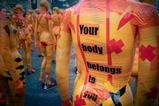In response to a previous Woman Alive article on biblical femininity, Sally Hope shares where she believes the writer got it wrong, and why.

It is over ten years since I left my abusive husband and in that time I have become a Domestic Abuse Recovery Worker. In this opinion post, Megan Madden wrote, “I believe all women are called to motherhood. To embrace femininity and live out a nurturing spirit, gentleness, receptivity; to be a helpmate to her husband, and to receive the heart of others well.”
Megan goes on to encourage wives to be obedient to their husbands, arguing that Mary was obedient to Joseph and to cite Proverbs 31 as evidence that women are called to be homemakers. Not only is this theology dangerous to women, it’s also a perversion of what the Bible actually teaches.
A helpmate?
The words often translated as “helpmate” or “helpmeet” can be found in Genesis 2:18. “Then the Lord God said ‘It is not good that the man should be alone; I will make him a helper as his partner.’” The theologians my ex-husband would sit me down to listen to, such as Mark Driscoll and John Piper would talk about this role of “helper” in the way one might talk about the support act for the main performer on a stage.
Not only is this theology dangerous to women, it’s also a perversion of what the Bible actually teaches.
Women are there in the background, serving, helping out, making sure the man can achieve his role as “leader” and “builder of society.” They used the phrase “equal but different” but if we’re honest, none of us believe the support act is equal to the main event. They mean equal in the same way the pigs in Orwell’s Animal Farm mean it when they say “All animals are equal but some are more equal than others.”
This is not the way the author of Genesis uses the term. The Hebrew words that have been translated as “helper” are “Ezer Kenegdo.” The word Ezer is used in several places in the Old Testament and is most often used to refer to God. To be clear, God is not the “support act” to men, and neither was Eve.
The word Ezer is used in Psalms 121:1 “I lift up my eyes to the hills- from where will my help come?” and in Psalms 46:1 “God is our refuge and strength, a very present help in trouble.” It does not refer to a mere assistant, but to a rescuer and deliverer. The word “kenegdo” is added to the phrase as an equaliser. It means to be equally balanced, like a scale, or equally yolked, like two oxen of equal strength pulling a cart. Eve was not subordinate to Adam, man and woman were created to be equal partners.
Many of the survivors I have worked with share my experience of having Proverbs 31 held over them as a standard they must meet
Proverbs 31
Many of the survivors I have worked with share my experience of having Proverbs 31 held over them as a standard they must meet, the ideal woman who cheerfully manages her home, works day and night, speaks only with gentleness and wisdom, and serves her husband. Yet my understanding is that Proverbs 31 isn’t even about a woman, it’s a metaphor for wisdom, and the first 10 verses show us that it was never addressed to women but to men. It is an instruction to men to be appreciative of and value wisdom.
Furthermore, the fictional woman described in Proverbs 31 is commended not for the roles she carries out but for the way in which she carries them out, she is described as a “woman of valour.” The Bible provides us with several examples of women of valour and these women held a variety of positions in society, a queen (Esther) a judge (Deborah) a prophet (Huldah) and even a sex worker (Rahab) we are not called to a specific job, we are called to act with valour in whatever we do.
Being a home-maker may be right for you and your family and that’s great, but it is no better or worse than being a teacher, a doctor, or anything else. It’s how we conduct ourselves that makes the difference, not what our job is.
Read more on being a woman
Unpacking the strong black woman stereotype
I’m trying to decide how, as a Christian woman, I should age - and Madonna is teaching me a lot
Finally, we are not defined by motherhood. Hannah was still a woman of valour before Samuel was born, as were Sarah and Elizabeth before the births of Isaac and John. Deborah, Huldah, Priscilla, Joanna, Phoebe, Esther are all praised for who they were and the way they behaved, there is no mention of whether they were also mothers.
The women we are presented with in the Bible were not all meek and mild, softly spoken and obedient, they were tenacious, brave and outspoken. They disobeyed governments, they broke religious rules, they sang songs of revolution and they showed up time and time again when men cowered in fear. Women represent the full breadth of human experience. Being nurturing, gentle, compassionate and empathetic are not feminine traits, they are human traits, they are qualities we see in Jesus and we should be encouraging them in our sons as well as our daughters.
*A woman is murdered by her partner or ex partner every four days in the U.K. When Restored in conjunction with the University of Leicester and Coventry University carried out research into the prevalence of Domestic Abuse within churches they had 12 respondents who stated that they were in fear for their lives.



































2 Readers' comments